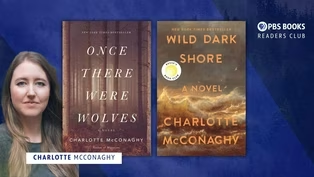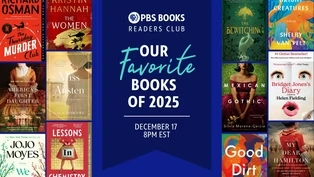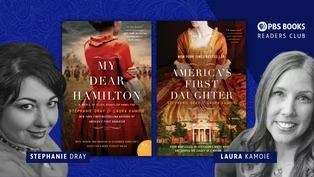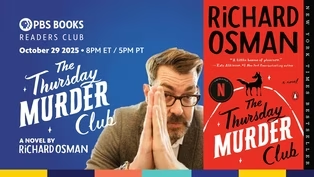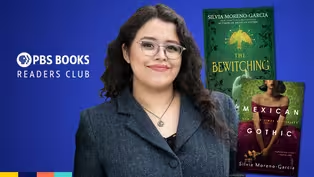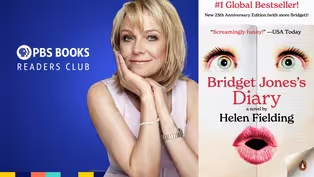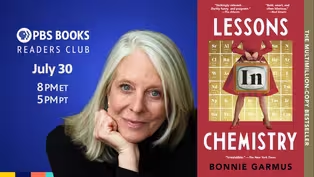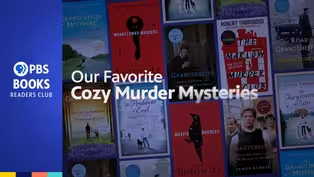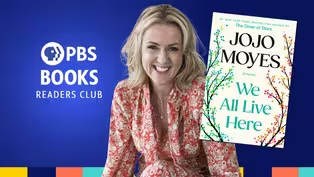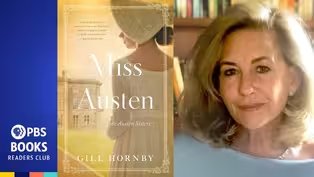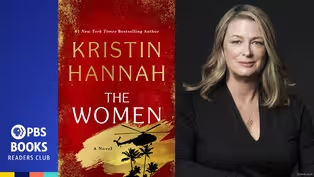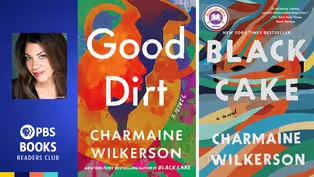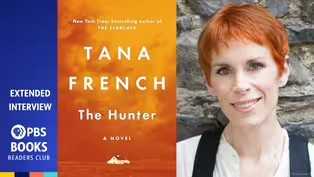
Readers Club | Tana French
Season 2024 Episode 32 | 55m 9sVideo has Closed Captions
Bestselling Irish crime fiction writer Tana French joins the PBS Books Readers Club.
From the New York Times bestselling author of "The Searcher" and “one of the greatest crime novelists writing today” (VOX), comes a spellbinding new tale set in the Irish countryside, "The Hunter". It’s a blazing summer when two men arrive in a small village in the West of Ireland. One of them is coming home. Both of them are coming to get rich. One of them is coming to die.
Problems playing video? | Closed Captioning Feedback
Problems playing video? | Closed Captioning Feedback

Readers Club | Tana French
Season 2024 Episode 32 | 55m 9sVideo has Closed Captions
From the New York Times bestselling author of "The Searcher" and “one of the greatest crime novelists writing today” (VOX), comes a spellbinding new tale set in the Irish countryside, "The Hunter". It’s a blazing summer when two men arrive in a small village in the West of Ireland. One of them is coming home. Both of them are coming to get rich. One of them is coming to die.
Problems playing video? | Closed Captioning Feedback
How to Watch PBS Books
PBS Books is available to stream on pbs.org and the free PBS App, available on iPhone, Apple TV, Android TV, Android smartphones, Amazon Fire TV, Amazon Fire Tablet, Roku, Samsung Smart TV, and Vizio.
Providing Support for PBS.org
Learn Moreabout PBS online sponsorshipMore from This Collection
The PBS Books Readers Club is a monthly digital-first series that brings its members into conversations behind the stories of your favorite books & shows. You can watch the online on the PBS App, with extended interviews available for PBS members on PBS Passport.
Readers Club | Ep 301: Charlotte McConaghy | Once There Were Wolves
Video has Closed Captions
PBS Books Readers Club hosts author Charlotte McConaghy to discuss her novel Once There Were Wolves. (58m 55s)
Readers Club | Ep. 212: Our Favorite Books of 2025
Video has Closed Captions
PBS Books Readers Club celebrates the wrap of its second season with a highlight of 2025 (47m 55s)
Readers Club | Ep. 211: America's First Daughter | Stephanie Dray & Laura Kamoie
Video has Closed Captions
PBS Books Readers Club welcomes co-authors Stephanie Dray and Laura Kamoie (1h 1m 45s)
Wed Oct 29 2025 | Readers Club | Ep. 210: Richard Osman | Thursday Murder Club
Video has Closed Captions
PBS Books Readers Club welcomes celebrity writer Richard Osman to discuss his best-selling novel (52m 44s)
Readers Club | Ep. 209: Silvia Moreno-Garcia | The Bewitching and Mexican Gothic
Video has Closed Captions
PBS Books Readers Club welcomes award winning author Silvia Moreno-Garcia to discuss her new book. (52m 42s)
Readers Club | Ep. 208: Helen Fielding | Bridget Jones's Diary
Video has Closed Captions
PBS Books Readers Club welcomes beloved British author Helen Fielding to discuss her iconic novel (59m 30s)
Readers Club | Ep. 207: Lessons in Chemistry | Bonnie Garmus
Video has Closed Captions
PBS Books Readers Club welcomes international best-selling author Bonnie Garmus to discuss her novel (49m 3s)
Readers Club | Ep. 206: Our Favorite Cozy Murder Mysteries
Video has Closed Captions
PBS Books Readers Club hosts a special event sharing Our Favorite Cozy Murder Mysteries (52m 32s)
Readers Club | Ep. 205: We All Live Here | Jojo Moyes
Video has Closed Captions
PBS Books Readers Club welcomes international & New York Times best-selling author Jojo Moyes (57m 37s)
Readers Club | Ep. 204: Miss Austen | Gill Hornby
Video has Closed Captions
PBS Books Readers Club welcomes international best-selling author Gill Hornby to discuss her novel (51m 18s)
Readers Club | Ep. 203: The Women by Kristin Hannah
Video has Closed Captions
PBS Books Readers Club welcomes international best-selling author, Kristin Hannah to discuss novel. (53m 29s)
PBS Books Readers Club | Ep. 202: Good Dirt & Black Cake | Charmaine Wilkerson
Video has Closed Captions
PBS Books Readers Club is delighted to welcome critically acclaimed author Charmaine Wilkerson (55m 29s)
Providing Support for PBS.org
Learn Moreabout PBS online sponsorship(gentle music) - If you're writing a book and you're writing about mystery, murder is the most high stakes mystery there is, and it's one that...
It delves into not just the mystery of who done it, but the mystery of what could bring somebody from being a normal person, not a villain, not a psychopath, not pure evil, but from a normal person to someone who will kill.
And that mystery, the mysteries of the human mind, are some of the biggest mysteries we've got.
(gentle music) - Well, hi, and welcome to the "PBS Books Readers Club."
- Today we'll be joined by the Queen of Irish crime fiction, New York Times bestselling author Tana French, to discuss her latest novel, "The Hunter."
- This book is an atmospheric thriller that follows retired Chicago detective, Cal Hooper, who moves to rural Ireland in search of peace.
But Cal uncovers layers of darkness beneath his picturesque retreat and realizes that even small Irish towns shelter dangerous secrets.
- We'll also reveal our pick for next month's read, so stick around for that.
- Hi, I am Fred Nahhat here with Lauren Smith.
Princess Weekes is an award-winning video essayist and author who brings her master's degree in literary theory to our table today from New York.
And Heather-Marie Monitlla, our resident librarian and the PBS Books' national Director.
- But of course, the most important person in this book club is you.
As we discuss "The Hunter" today, please share your thoughts with us and other book lovers in the comments.
It really means the world to us to have you in this book club, and we really wanna know what you think - And join the PBS Books Readers Club Facebook Group to find and share book recommendations to discuss your favorite reads all month long.
- Truly the best book group ever.
These folks give awesome book recs, and please make sure to share this event.
Friends, do not let friends miss out on great books.
And what's better than a book club with great friends?
- Nothing.
It's the best.
So let's talk about "The Hunter" by Tana French, who is standing by to join us in just a moment.
This is the follow up to the New York Times bestseller, "The Searcher," which tells the story of ex-cop Cal Hooper who moves to Ireland for an early retirement.
Sounds peaceful, right?
- Peaceful in theory, but it doesn't take long for him to uncover a dark mystery surrounding the missing brother of a local kid named Trey, who becomes Cal's unlikely and often reluctant companion.
- Now, although they both stand on their own, "The Hunter" picks up where "The Searcher" left off when Trey's unreliable father arrives back in town with a moneymaking scheme- - Hate that guy.
- That once again budges Cal and the Irish locals into a tangled and suspenseful who done it.
- So book friends, what are your thoughts on this book?
Princess, Kick us off.
- I grew up with a mother who loves thrillers and detective stories.
I'm a Columbo girl through and through, so this was really fun for me.
It was fun to revisit the genre.
And I also love Ireland.
I've been there twice.
It's one of my favorite places to visit.
So this was just a really engaging thriller, and it's been really foggy in New York.
So it was honestly the perfect reading material for the last couple weeks.
I really enjoyed it.
- Good.
What did you think, Heather?
- You know, for me, it really was interesting to think about the lengths you go through for people you love, the sacrifices you make and what you're willing to do, also that theme of found family.
But I have to say the title surprised me because I expected more gore- - Hunting?
- More hunting, more hunting.
(all laughing) For sure.
What about you?
- Well, to me, and I guess I'm showing my interest.
I love the '70s private detectives that I grew up watching on TV.
And to me, that's Cal Hooper.
He's every bit of Kojak, every bit of Jim Rockford.
I love the archetype wild about the book.
- Yeah, I really like how he's my kind of guy, and I love the relationship between him and this young kid, Trey.
- Yes.
- And like you said, the relationships played such a big role in this, and I love Tana French's writing.
Sometimes I love a good cozy mystery, but sometimes they're sort of pithy.
Hers is sort of a slow burn.
And the way that she describes Ireland, like you said, Princess, it really makes you feel like you're there.
And the town and the atmosphere almost plays like another character in the story.
- Yes, thinking about the land and the relationship that these people in this town have to their lands.
Yes, the land could hold this mysterious way for them to get wealthy, but it's also they're really connected with their land.
And I think for me, as someone who moves around a lot, I had to think about that.
- Yeah, and I gotta say I had a chance to talk with Tana a few days ago and just get her prepared for the interview.
And she is the most lovely, delightful, happy, positive person, and I cannot believe that these dark mysteries and thrillers are coming from her mind.
I can't wait to see how she gets into that mode.
It's so interesting.
- Well, we're gonna find out.
so much to discuss with Tana French.
She is standing by to join us in just a moment, and we wanna invite you to join the PBS Books Readers Club too.
Tell us what you thought about "The Hunter."
Maybe post a question or two for your other book clubbers to react to.
- [Lauren] Yeah, so much fun.
Like any good book club, it's more fun when we all get involved, and there are many ways to connect, including our e-newsletter.
You'll find exclusive author interviews, book recommendations oftentimes from our author friends, which is fun, and so much more.
Visit pbsbooks.org/subscribe to sign up - And make sure you follow PBS Books on Facebook and on Instagram and fill up your feeds with great books and great authors.
- And if you really love this PBS Book Club, I hope you'll take a moment to show your support.
PBS stations rely on donations from folks like you and me.
And if you'd like to see more of the "PBS Books Readers Club," here's a great way to keep it going.
If you're watching on Facebook or YouTube, just click the link in the description or comments, or visit pbsbooks.org/donate.
You'll be taken to your local PBS stations giving webpage where you can find some PBS Book swag as our thanks for supporting this program.
One of those gifts is an ebook download of "The Hunter" or any one of our PBS books features for your phone, tablet, or e-reader.
After you make your donation, you'll receive an email with a link and a special code to download one of our featured books.
- Or you can get one of our official PBS Books mugs.
Just $5 a month will get you the PBS Books mug, and it makes you a member of your local PBS station giving you access to all the amazing shows and passport, including the extended edition of this interview with Tana French and a library of our favorite detective and mystery series like "Grantchester" and "DI Ray."
- Yeah, Fred, everyone's been asking for these mugs.
We had to bring them to the people.
Look at the back.
My weekend is booked.
- I love it.
- It's so cute.
Perfect for cozying up with your next great read.
Well, it is perfect as you say.
So if you want to see the "PBS Books Readers Club" continue, we have to hear from you.
Just click the link in the description or visit pbsbooks.org/donate.
We will send you a set of the official PBS Book stickers too, along with your ebook or your mug.
Again, donations support your local PBS station and it will help us keep the book Club going for another month.
And now let us welcome in, Tana French.
Tana, welcome to the "PBS Books Readers Club."
- Thank you so much.
It's wonderful to be here.
- Well, thank you so much for joining us and for these incredible books, "The Searcher" and "The Hunter."
Tell us how the idea for these stories came to be.
- Well, I had never read any Westerns before, and then Pat Anderson from the Washington Post actually recommended that I should read "Lonesome Dove."
And I thought, okay, might as well try it.
I'll be honest.
I just didn't expect it to be my kind of thing, but it turned out I loved it.
And I started reading other Westerns.
I read "True Grit" and on a more modern note, "The Sisters Brothers."
And I started noticing how well some of the Western tropes would map onto the West of Ireland, how much in common their settings have with the West of Ireland.
There's this very beautiful but very harsh terrain that demands serious mental and physical toughness from anyone who wants to make a living from it.
But there's also this sense of a place that's so far removed from the centers of power, both culturally and geographically obviously, that the people feel like the power brokers don't understand their lives, they don't care about their lives, and if they want to have a cohesive society in any form, they're gonna have to make their own rules and enforce them themselves.
And that actually is a theme that shows off in a lot of Irish drama as well.
So I was thinking how would some Western tropes map onto that West of Ireland setting?
So I guess I called these books mystery software running on Western hardware.
I think it's the best way to put.
- I love that.
- That's amazing.
- I didn't think about it being a Western as I was reading it, but now that you explain that, I think I'm gonna have to go back and read it again through that lens.
That's really interesting.
- It makes a lot of sense.
We are so grateful for the characters, and I think we were all wondering, were you always planning to write "The Hunter" as a follow-up to "The Searcher" or did that realization come later?
- Oh, way later.
I had written "the Searcher."
I thought it was one and done.
I thought that was a standalone.
And then there was a while there where, like everybody else, my brain was just fried with COVID and kids doing distance learning and all that stuff.
And I started to come out of the pandemic haze and think about a new book, and I realized there was more in there, like in "The Searcher" I've been playing with the tropes of sort of the stranger who blows into town and you know he's gonna be a catalyst, things are gonna change around him like that western thing.
And I started thinking, what else would fit well onto that West of Ireland setting?
And I was thinking about the gold rush idea.
There's gold in them there hills, and about the guy who returns from a journey bringing trouble in his wake.
And I was thinking about Cal and Trey and how their relationship's been left at quite an interesting fragile point where they've started to build it, but it could still be knocked off balance pretty easily in The Searcher, she believed that all she needed was to know what had happened to Brendan, and then she'd be able to leave it behind.
But by "The Hunter," even though she has given Kyle her word, she won't do anything about what happened to Brendan.
She still feels a need for some kind of revenge on the entire townland, which she holds responsible for his death on sort of multiple levels.
And that opportunity gets brought to her when her father comes back.
I don't wanna give away too much, but she's got an opportunity for revenge, and that becomes, in a way that is not entirely healthy, her coping strategy, is throwing everything she's got into this revenge.
She's a teenager, she's 15, she doesn't think long term.
And she's just at that transition point where teenagers start to mature into people who can in fact think in terms of long-term consequences and the effects their actions will have on the people they care about.
She makes that leap in the course of the book.
And so in order to do that, she has to balance this desire for revenge and everything she's used as a coping strategy against the effect it will have on the people she cares about.
And she has to decide which of those two things to sacrifice.
And it is, like a lot of Westerns, a book about revenge.
- Lena is such a fun supporting character in the first book and gets a lot more development in "The Hunter."
She's so dynamic, very much how the traditional kind of love interest and her connection with the town is so fascinating.
I would just love to hear more about her development and how you saw her grow in your mind from the first book to the second.
- Well, in the first book, she kind of came into it as a counterpoint to Cal, who is an outsider sort of innately because he's an American who was blown into this small rural Irish town.
And Lena, although she was born and brought up there, is an outsider by choice.
She doesn't want the experience of being sort of too involved, too woven into this little townland because she's too aware of how intrusive it can be and how much it can demand of you in exchange for being a part of it.
So she's very deliberately set her distances and kept herself separate.
And in "The Hunter," I wanted to flush that out a bit, and what it would mean to somebody to be drawn into this kind of quasi family relationship with Cal and Trey where they didn't deliberately set out to become some kind of family, but that's what they are now.
Lena and Cal are to an extent raising Trey, and what that would do to her kind of self-imposed isolation and her boundaries to find that she's being drawn in, whether she likes it or not, to something that puts Trey in jeopardy.
How far would she be willing to go across those boundaries in order to save Trey?
Again, like Trey, she's being forced to sacrifice either somebody she cares about or her own needs and boundaries.
And what do you do when those two things need to be balanced?
- The character of Lena also provides a really interesting commentary on marriage.
Early in the novel, Lena responds that marriage is a funny thing.
Those of us who are married know that, but later, Mart is discussing with Cal about marriage mile.
I was interested, what is marriage mile and is it really truly part of a tradition in Ireland or parts of Ireland's?
(Tana laughs) - Oh, well, this is...
In the pub, Cal and Lena have just kind of accidentally got engaged.
They weren't planning to, but it seemed to be necessary for reasons that are made clear.
And the guys in the pub see this as an amazing opportunity to give Cal a seriously thorough slagging.
And one of the things they do is explain to him a local tradition of the marriage mile, which is, if you get engaged, you need to strip down to your boxers, light a torch from your heart fire, carry it around the village, and take it to your bride's hearts to prove that you're healthy and fit to be the patriarch of a household.
(laughs) There is absolutely no such tradition that I've ever heard of, (all laughing) but there is a longstanding Irish tradition of slagging both strangers and friends, and it's a very complicated and nuanced thing, the way you slag your friends.
It can be a test.
It can be a sign of affection.
it can be a challenge.
It can be a way of putting someone in their place.
And in this instance, it's kind of all of those things.
the guys in the pub are seeing if Cal will fall for this.
They're hoping he'll fall for it because they would absolutely adore it.
The town loved having a chance to watch him run around with a torch in his boxers.
But they're also seeing whether to what extent he belongs, to what extent he's become aware of the way this place works and whether he will just fall straight into it or whether he'll call them on it.
And he does more than call them on it.
He comes up with a few things, a few things to fool them of his own.
And that in a way is a mark that he does belong now.
It's kind of an initiation rite.
- Both "The Searcher" and "The Hunter" take place in Ireland, which is also your home.
Your writing is often praised for its vivid and immersive settings.
Can you discuss the research and creative process behind bringing the rural Irish landscape to life in "The Searcher" and "The Hunter"?
And talk to us about your relationship with Ireland and how place plays a role in your novels.
- Well, I'm more Irish probably at this point than anything else, but I'm not actually Irish.
I wasn't born here.
I spent my childhood traveling around a lot.
I was what they call a third culture kid now, I think is the term.
Somebody who's not really from anywhere and your parents are from various places and you live in various continents.
And it left me with a very strong sense of the importance of place and what a powerful thing it is.
And I think it's also quite a good position for a writer to be in, to be never quite an insider anywhere because you never take a place for granted.
You never take the place itself, or the customs, or the traditions for granted.
You're always having to notice them, the little nuances of cultural assumptions.
Because if you don't do that, if you're not paying attention, you're never gonna fit in.
All your communication is gonna be skewed because you won't be communicating within the language of the place where you are.
Not just the literal language but also just the little tiny conventions.
And so I grew up always noticing this stuff and the differences that place made to people, and with a lot of emphasis on how important place is in shaping people in relationships and experience.
And so when I started writing about Ireland and in particular the west of Ireland, I was drawing on a lot of love for that entire area.
The West of Ireland is one of my favorite places in the world, possibly my favorite place in the whole world to go.
And I was drawing on that and on the weight that place had had in shaping my experiences there as a teenager and as an adult and wanting to do it justice in all its beauty and in all the amazing ways its people interact with that land.
So I think it was just a lot of long-term experience on multiple levels that maybe want to write about this place and want to do it justice.
- Well, I'm always curious about process, and it's especially interesting when it comes to writing a mystery and the intricate psychological portraits of your characters.
How do you navigate creating suspense in your writing?
- Not in a very organized way.
- Not true.
- I really don't.
I don't plan ahead.
I do know writers who have everything mapped out like chapter by chapter before they ever start writing a book.
I'm in awe of them and I envy them because it would be kind of nice to know before you start that there's definitely a book there and that you're not gonna be left with a handful of loose ends going, "Oh God, what do I do now?"
But it's not how I work.
What you said about the character portraits is interesting because I work very much from character.
I was an actor for a long time, so character's at the heart of writing for me, and I have to get to know the characters for a while by writing them before I can figure out who would do what to whom for what reason.
So I don't actually know when I start a book who'd done it or why they'd done it, and sometimes I'm not even sure who's gonna end up dead like in this one.
I didn't, I wasn't sure.
- That's fascinating.
- You have power.
- I had two options.
Yeah, it could go either way, who knows?
But I think in some ways, I hope anyway, that helps with the creation of suspense because things are coming to me as revelations along the way.
I was surprised by who had done it in this one.
I had not particularly seen that coming.
So I'm hoping some of that sense gets through to the audience where there's that moment where you go, "Oh of course, but, wow, I never saw that coming."
I'm hoping that leads to suspense.
- Well, following up on that character development, I love the comparison to the Western genre.
I was comparing it to what I was raised on 1970s private detective shows.
And so thinking about the necessity to always have the villain, now there can be no more loathsome character than Johnny Reddy.
I mean you get a visceral feeling about Johnny Reddy.
Talk about developing his character, and is there anything redeeming about Johnny Reddy?
- He was a lot of fun to write.
I have to say he was a lot of fun to write because he was sort of mentioned a few times in "The Searcher" as this basically no-good guy who was consistently coming up with bright ideas that were never gonna go anywhere, and who just wandered off on his wife and poor kids.
And this time he comes back...
Sorry, actually, I think he might have more kids.
Who had just wandered off on his wife.
- Trying to keep track of your own characters.
I love it.
- I don't know, there's kids everywhere.
- A little menagerie.
- Right, and they go in and out.
I don't know.
He had shown up in "The Searcher" as this guy who was full of ideas, that were never gonna come to anything, lots of big talk, lots of charm.
And he just kind of wandered off on his wife and kids when things weren't going his way.
So when I realized that he had to come back in, he was automatically going to come in as a threat because Cal has accidentally almost taken on the position of father figure in Trey's life.
So if her actual biological father comes back, there's gonna be tension there.
There's going to be some kind of threat to everything that they've built up.
And I thought, what if he comes back with an idea, some big scheme that's obviously gonna have a scam element to find gold in the townland and make everybody rich forever and it's gonna be amazing?
And then I had to develop, peel back the layers and go, who is he scamming really?
Who is he willing to scam and what is he willing to do for this?
What is he willing to sacrifice and who is he willing to put in jeopardy in order to do this?
And in some ways, he's the contrast to Cal as the almost anti-father figure.
Well, Cal's been doing his best.
He doesn't know what he's doing, but he's trying to be the father figure that Trey needs.
And Johnny's the dark half of that.
He is the father figure that nobody needs ever.
- Agreed.
- Agreed.
- That's so powerful.
Well, you said that you let it kind of, the process is looser.
So I'm really curious about the POV shift because, in "The Searcher", we're primarily in Cal's point of view, we see everything through his eyes, but, in "The Hunter," we get Trey and Lena and other different voices and lenses we see the story.
Why do you think it was essential to do that?
And at what point did you realize which characters you wanted to hear from the most?
- That was actually one of the first things I realized about the book.
Because like I was just saying, it's a family story.
It's a story about families.
"The Searcher" was a story about one guy, Cal, coming to this little village, trying to figure out how he belongs, what he brings, how that fits in with his sense of right and wrong.
But "The Hunter" is a family story.
It's about the families we make for ourselves, either accidentally or on purpose, and whether blood matters more than love and action.
And it's about these two different kinds of families.
And because it is that, because it is a family story, it had to be from all their POVs because the real action doesn't take place from any one character's perspective.
It takes place somewhere in the zone in between Cal and Lena and Trey.
That's where the stakes are highest.
It's a thing that they've built together that's at stake.
That's what matters.
And so the heart of the story is between them.
And so the narrative had to be split between them as well.
- Tana, we talked about character development, we talked about Ardenkelty and this grander scene.
I'm such a fan of writing that I'm always pulling out passages particularly about scene setters.
And one in particular, this is in the shop, and it's so... To me, it takes me there.
Let me just read it real quick.
"The shop is hot and Noreen's stacking has stirred up dust motes that eddy in the broadbands of sunlight through the windows.
Nellie whines discreetly at the door, then gives up.
Outside, the boys give a startled shout, and the bunch of girls burst into helpless happy laughter."
Again, takes me right there.
Talk about the importance of scene setters and how those smaller moments contribute to the larger story.
- This is something that matters a lot to me, that characters aren't only existing within the story, within the needs of the plot.
They have an entire existence outside that.
They're living their lives even when you're not watching them.
And I think scene setters are one of the ways that you bring the audience to a realization that they have whole lives.
They live in places, they move in and out of these places when you're not looking, and they're doing things.
They're continuing to live for 24/7, and I think that's what these little moments mean to me.
I love them when I find them in other people's books, the moments when you just get a glimpse into their world, not in terms of the needs of the plot, not in terms of anything to do with what's actually going on in the book, but just the world itself.
So I try to throw them in for that same reason, 'cause I love them when I find them.
- So you mentioned earlier that you don't always know where your novels are going to go when you're plotting out a mystery.
I'm really interested in this.
I wanna know, how do you go about crafting this?
Do you start writing up characters?
Do you just start from the beginning and see where it takes you?
Dive a little bit deeper into your process, and where do you start?
How do you go about it?
I'm fascinated by this concept.
- Well, I tend to start out with a really strong sense of the main character, or in this case, the three main characters.
A very strong sense of the setting, which again I already had from the previous book this time, but also a very strong sense of the premise.
What's the core thing that's going to happen in this book that's going to change everything?
And then I just spend a lot time thinking about what the main character or characters would make of this premise, what they would need to do, what their objectives would be around it, what kind of conversations would people have around it, where would those lead?
And those tend to lead to the next step, and the next step, and maybe extra plot elements.
And sometimes what happens is that a character just wanders up that I'm planning on using in one scene, and then they turn out to be crucial, like in "The Searcher," Mart, Cal's neighbor who's kind of the quintessential older Irish guy who always has an agenda and goes at things very obliquely, and his sense of humor hides whatever he wants it to hide.
I just threw him in there because I thought, Cal, we're gonna need to see him interacting with the guys he lives near.
And then it turned out, as I kept writing the book, that I started noticing ways in which Mart probably matter quite a lot.
And then that got factored in.
And the same went for characters in "The Hunter" where Sheila was there because she needed to be, because it's part of the entire family dynamic and the strange crisscross of found family and biological family.
And then I started realizing that, wait a minute, she's not going to be sidelined in this.
She's gonna stop being sidelined.
She's actually gonna have a role to play within this plot.
I think you do a lot subconsciously really when you're writing like I do, which is flying by the seat of my pants, Your subconscious is throwing- (all laughing) I really am.
But your subconscious is throwing things in there, and only later you go back and reread chapter three and go, hey, wait a minute, I actually need that in chapter seven.
That's actually gonna be a lot more important than I planned.
Well crap, I'm gonna have to rewrite everything in between.
Great.
- Well, picking up on that process, which I might call literary athleticism, this by the seat of the pants kind of approach.
You must stay vigilant as you described.
As you're going through it, how do you stay motivated to avoid a lull or some point in the path where you just fall off?
How do you keep in the game?
- Well, I think...
I mean, I do, I do completely fall off the path, and then I go back and go, "What the heck was I thinking?"
And there's a lot of delete button.
But I think the mystery genre is really good at helping you do that.
It's one of the reasons I write mystery, is because I...
I write long anyway, right?
And I get distracted easily.
So I would happily keep going, and every book would be a million words long, and they would take 10 years to write, and I'd just be having fun with these characters.
But the thing about mystery, it's got a very clear arc where A kills B, and C finds out who did it, and there's a huge amount of variation you can have within that.
There's a huge amount of bending those rules that you can do, but that structure is firmly in place and it sort of keeps you on track.
Because when you are writing along, you have to be going with every scene.
Okay, I'm having fun with the characters here.
Okay, I'm enjoying writing this dialogue, but is it actually moving the plot forward?
Is it taking us one step closer to that moment where C finds out who done it?
And if not, you might wanna rethink it and either sort of seed in more plot elements there or just kill that scene 'cause it's not needed.
- It's hard to kill a good scene.
It's hard to...
Sometimes you get precious about something that you create.
It's hard to let it go.
- Less is more though.
Brevity is the key to happiness.
- Yeah.
Oh, don't be saying that, I write long as- (all laughing) - No.
- No, I love the tone.
Give 400 pages and an appendix.
Give me two.
I like the good ones.
- Tana, I can't help but notice that you are an incredibly lovely and seemingly positive person.
What is it about murder and crime that captivates you?
And how did these things come out of your seemingly adorable and charming brain?
- Well, thank you very much, first of all.
I like to think I am a pretty positive person, but weirdly, a lot of the mystery writers I know are kind of upbeat, and sociable, and cheerful.
And I figure it's because, if anything dark ever pops into my head, I've got an outlet for it.
I've got somewhere to put it.
It just doesn't hang around there bouncing around.
I can write it down and with any luck I even get paid for it.
That's great.
(all laughing) But also, it's not so much murders that fascinate me.
It's mysteries.
It's not crime.
I have always, since I was a little kid, I've been enthralled by mysteries.
I can remember being six years old, and some school book or other had a page about the Marie Celeste, the ghost ship that was found drifting.
Everybody had vanished.
According to my school book, the breakfast was still cooking in the galley, and the people who had been on the ship, the crew, were never seen again.
And I was fascinated.
I can remember being six, lying face down on the carpet, reading this and going, "When I die, I'm gonna ask God what happened."
(all laughing) I still remember.
- That's me with JonBenet.
- Yeah, there you go, yeah.
I need to know this, the mystery was what fascinated me, and I've been like that ever since.
I don't care if the mysteries are real, fictional, solved, unsolved.
It's the element of mystery and the process of finding out not just the solution itself, but the process of moving closer to the solution has fascinated me ever since.
I've worked on a couple of archeological digs for that same reason, because you're getting closer to understanding the solution to a mystery of who were these people.
What were they doing?
And if you're writing a book and you're writing about mystery, murder is the most high stakes mystery there is.
And it's one that it delves into not just the mystery of who done it, but the mystery of what could bring somebody from being a normal person, not a villain, not a psychopath, not pure evil, but from a normal person to someone who will kill.
And that mystery, the mysteries of the human mind are some of the biggest mysteries we've got.
So I think you wind up writing about murder if you're fascinated about mystery because it's so high stakes and because it brings you so deep into the places, the hidden places of the human mind.
So for our book, clubbers that follow PBS books on Facebook and Instagram, we offer the opportunity to submit a question for our authors.
If you're at home and haven't followed us on social media yet, be sure to do that right now so you can submit your questions.
Tana, this question comes from Lisa who writes, "After 'The Searcher,' I fell in love with Tana French's writing.
I would love to know how she does such extensive research.
Has anything in her life influenced her choice of subject matter?"
- Oh, that is a really interesting question.
I don't think anything in my life has influenced a specific choice of subject matter, but I think...
Okay, no events have happened to me that have shaped what I wrote about or anything like that, but I think living in Ireland has shaped everything about the books, not just the settings, but also the plots of what I write.
Because I think murder mysteries, of all things, are a genre where, whether you want them to or not, they tell you a lot about the society where they're sat.
Because murder happens in every society and every time and place as far as I know, but the reasons for which it happens are very shaped by that time and place.
For example, in Ireland, you could well get a murder over the ownership of farmland.
We have had them relatively recently within the last few years, but you wouldn't get that within a nomadic tribe that doesn't think of land in the same way.
So the minute you've got a murder mystery, you are delving into what's important in that society.
What are the priorities?
What are the fears?
What are the dark places?
This genre lends itself to topics that are very deeply connected to the dark places in society.
So I think the fact that I live in Ireland, the fact that I kind of almost ended up here semi by accident as a teenager has shaped the plot of every book I've written.
"Broken Harbor" is to a large extent about the national deep need for home ownership and the way that turned into a national madness for a while.
"Faithful Place" is about the tenements of Dublin and the way in which they shaped family, relationships, and neighborhood relationships, and community relationships.
So I think those books couldn't have happened if I'd been living somewhere else because these are the priorities and the historical tangles on historical dark places and the roots of Irish society today.
And if I've been living somewhere else, if I've been living in New York or in Denmark, none of these books would've ever been the same.
- So that was a great question, first of all, from Lisa.
Thank you for submitting that.
Now, I want to spin this conversation around for just a moment, and give you, Tana, a chance to learn something about your readers.
So if you're watching this on Facebook or on YouTube, your job now is to put your comments in and respond.
Tana, if you've ever wondered what your readers think about your books or their reading experience, now is your chance.
This could be a general question or maybe you want to know what their thoughts were about "The Hunter."
So Tana French, what questions do you want to ask your readers?
- Okay, there is one very practical question that I have always wanted to be able to ask a big group of readers.
So I'm totally taking this chance.
Okay, I'm writing from an odd perspective where I am, like I said, not really from anywhere and not 100% Irish.
And I'm writing about Irish characters mainly, but I'm writing for...
The majority of my readers are American.
So it's a hard balance, and I'm constantly trying to get it right where I want to use Irish slang, Irish dialogue, Irish phraseology.
And especially with older characters like Marts in "The Hunter" for example, the dialect can be quite heavy.
So I'm trying to use that and make the characters authentic and also give readers a bit of the flavor of the dialogue you get among older, rural people.
But at the same time, I'm trying to be comprehensible here.
I don't want people reading the books and going, "What is this character talking about?"
So I try to use, when I get more into, the Irish phraseology, specifically Irish phraseology, I'm trying to do it in a way where it'll be clear from context or where I can explain it or hint at the meaning a little bit in the dialogue around it, but I'm never sure whether I'm getting it right because as somebody who's moved from culture to culture a lot, you sort of take for granted that you have to translate from context all the time, but not everybody is going be ready, willing, or able to do that.
So I want to know, I would love to know, am I getting the balance right?
Do you understand what the Irish characters are saying or are you going, "What on earth are they talking about?"
too much of the time?
- That's a great question.
- Great question.
Of course I can answer it from my perspective.
Fair play to ya.
I know exactly what that's about, runners, the guard, all of it, I love it.
- In a post dairygirl society, I think everyone loves the slang, personally.
I like it, personally.
- Yeah, It's great.
- I think it's fun.
- Oh great.
- The atmosphere, yeah.
- We'll see what the readers think.
So share your responses here with Tana French right now in the comment.
You never know.
You might influence her next great novel.
Tana, hey, listen, it's been so illuminating to discuss "The Hunter" with you, so thank you for that.
Now book clubbers, a quick note to remind you that we'll be revealing our PBS Books Readers Club Pick for the next month at the end of this episode, and it's a good one.
So be sure to stick around for that.
But first, Tana, I know our audience wants to get to know you a little bit better, so we have a few more questions about you if you are up for it.
- Oh yes, definitely.
Did you always know you were a writer, even as a young person or did that realization come later?
- Oh no, I knew from when I was six.
I was that kid who was writing stuff under the covers at night with whatever light source my mother hadn't discovered and taken away.
I was always gonna be a writer.
I still have some of the short stories and the really terrible teenage poetry tucked away somewhere where hopefully nobody will ever find them.
I sort of sidetracked for a while though, because I trained as an actor and went into acting for a few years, but then I was in between gigs.
I was working on an archeological dig and had the idea for "In the Woods."
And I hadn't tried to write a book before, but I thought, well, nobody's gonna tell me what happens at the end of this story.
If I wanna find out, I'm gonna have to write it.
So I sort of came full circle, came back around.
- Love that.
I do love that.
What's your ideal writing setup?
Are you a morning person, a night owl?
Do you like to work in the office, in a coffee shop, or do you mix it up?
- Oh, okay, my ideal writing setup is not my current writing set.
Any of you guys who have kids know that kids are gonna be in this story somewhere?
- Yes.
- Before I had kids, I was a night owl.
That's what I like.
I like getting up at about 10 o'clock and then staying up until 2:00, 3:00 AM writing and then going to bed.
My brain doesn't even work properly until about after 10:00 PM.
- That sounds like somebody else I know, - Yep, that's for sure.
(all laughing) - Unfortunately, then I had babies and they had other ideas, and they did not think I should be allowed to sleep till 10 in the morning.
And now I've got school aged kids, so I'm up for the school run.
So now my writing hours are between when I get them to school to when they come back in the door.
But okay, it's not my dream scenario in terms of the hours of the day, but it's amazing how much it puts the pressure on and how much you can get done when you know that, at this time of the day, there are gonna be people banging in the door going, "Oh, let me tell you what happened at break time.
And can I make a costume for this by tomorrow?"
You know, all this stuff.
Yeah, that having that deadline puts the pressure on.
I got a lot done.
- Yeah, very similar for me.
Yeah, when the kids get home, all bets are off.
- The most beautiful of all deadlines.
- The most beautiful of all deadlines, I like that.
- Yeah, my favorite deadline.
When it comes to reading, are you physical book, e-reader, audiobook, or sampler all three?
- No, physical book.
Physical book all the way.
I like the feel of the book in my hands.
And I think everybody's different, but for me, stuff just goes in better.
The meaning goes in better through my eyes than through my ears.
So I need the physical book and my house is full of way too many physical books.
I really should switch to e-reader, or audiobook, or something, but it's not.
I will fight all the way to have my stacks of books stay put.
- Okay, two-part question for you and made more interesting by all of our discussions of this is a Western 'cause now I'm imagining your book as two-thirds land, one-third sky.
So two part question for you.
Has there ever been a movie that was better than the book?
And if your book became a movie, who would play Cal in "The Hunter"?
- Okay, I definitely know a movie that I think was much better than the book, and that's Greta Gerwig's "Little Women."
I read "Little Women" as a kid, and I'll be honest, I didn't particularly like it.
- Controversial answer- - But when I saw the film- - I like it, bold.
- I'm with her.
- Yeah, no, I know.
There are a lot of people who love it and who are probably wanting to reach to the screen and give me a good smack for not liking, but I really didn't.
But then I saw Greta Gerwig's adaptation, and it was like she illuminated the book and I suddenly understood it.
For the first time in my life, I suddenly saw what this was all about and the richness of the family relationships and the journeys of the characters and just the way their interactions shaped them all.
And I went, "Oh my God, that's what that book is."
And so yeah, I definitely think.
that's one movie adaptation that's better than the book.
For who would Play Cal...
Okay, see, I'm coming to this from someone who was an actor for years, still does bits occasionally.
I believe in actors.
I don't like people being cast because they're like the character.
I like people being cast because, even though they're nothing like the character, this is a really good actor who can submerge themselves in the character and get themselves out of the way.
So they're giving all the space to the character.
I feel like that's what an actor's job is.
So I wouldn't care.
If there were a movie, I wouldn't care who played Cal as long as he was really, really good because then he'll be fine.
- Quick tip for you, we interviewed Allison Pataki a few months ago.
Her book "Finding Margaret Fuller" was one of our picks earlier this year.
And Louisa May Alcott is a young child, a character in that book, and it's really, really interesting.
It's all about the different authors that are in that sort of Concord area, Thoreau... - Transcendentalist.
- Yeah.
It's a really good story, but it builds out this amazing character of Margaret Fuller who we didn't really know about before, but that would be...
I think you would like it.
- Yes, for sure.
- Oh, brilliant.
That's going.
I needed something on my list.
That's going on my list.
Thank you.
- Okay, great.
Okay, back to the questions.
Tana, what is your favorite book from your childhood?
- Okay, I was a sucker for time slip books, always the back in time books.
And luckily, I was a kid in the '80s, these were everywhere for some reason.
I don't see so many of them now, but my favorites were a series called "The Children of Green Knowe," which are set in a real house that is the oldest continuously inhabited house in England.
And this little kid just goes there to stay with his great-grandmother for the holidays.
And he runs into kids who lived there across the centuries.
And I thought this was utterly fascinating.
I was enthralled by this.
I spent the rest of my childhood looking for some like door, or treasure chest, or something that would let me slip back in time to the years 1590 or something like that.
- Oh, that's amazing.
Favorite books you've read in the past year?
- Ooh, okay, I really liked "The Essex Serpent" by Sarah Perry, which is a strange book.
It's not like any other book I've read.
It's about a woman in Victorian England coming to stay in this place where there's been all this rumor of this maybe real, maybe not serpent coming up out of the marsh, and how everybody, the life of the town and her life shift around this.
It's beautifully done.
So I love that.
And also, I'm a bit late to the table, but I really like "The 7 1/2 Deaths of Evelyn Hardcastle."
Strange, mind-bendy book, but I loved it.
- Amazing.
- What's the best advice you've ever received about writing or otherwise?
- I guess it's probably gonna be the same, writing and otherwise.
My acting teacher was very big on... And it sounds like simple advice is much easier said than done.
Stay in the moment and pay attention.
He was basically like, if you do that, you are halfway there as an actor, as a human being, as a writer.
If you can manage to not superimpose your own preconceptions, your own ideas of what should be happening now, but isn't your own ideas of what you'd like to happen, if you can strip all that away and really be paying attention in the moment and responding, you're halfway to making things work a whole lot better.
And that works as a writer too, actually.
- Well, assuming that would be the advice you'd give to aspiring writers, they say write what you know.
Would you go with that advice or would you seek a more exploratory version of write what you don't know and find out?
- Listen, I write murder mysteries.
I have no plans to ever murder anybody, (all laughing) or to be a detective, or anything like that.
So I can't really say write what you know.
And also, no, I'm not a fan of write what you know, because I think it goes against the entire point of the arts where the point of writing, painting, theater, everything is to give you a glimpse into someone else's world, and to accept the fact that, with empathy and imagination, we can get even small glimpses into someone else's way of seeing the world.
And if you say, write what you know, then what you're doing is saying that this leap of imagination empathy cannot exist, That you can only speak for yourself.
If I can only ever write like a middle-aged third culture kid with a background in the arts, I'm denying everything that makes writing interesting.
I would much rather write some American detective who just blew into an Irish village because that's a leap of faith.
It's an act of faith in that transformative power of the empathy and imagination that go into this process.
It's a leap of faith that I can imagine the world through his eyes, which is gonna be a very different world from the one I see, and I can offer a glimpse of that to an audience.
So no, I'm not gonna say write what you know, never.
- I like that advice.
- I do too.
I love what you said there.
That spoke to me.
That was beautiful.
Thank you so much.
- I hope it made sense 'cause I feel obviously really passionately about this.
- It did.
- Yeah, no, that was- - Things can get inarticulate.
Very beautiful.
Finally, Tana, anything that you would like to say to your readers?
- The main thing I want to say, and I wish I could say this to every single reader individually, is thank you so much.
And thank you not just for reading my books, but specifically because I know I write long.
I know I write big, long books, and that means that when you pick up one of them, you're not just investing money, you're investing time, and that is something that God knows nobody has enough of these days.
So I really appreciate you taking that risk of all those hours on my books, and I really hope that I repay it properly, and I'm gonna do my best to keep doing that.
- Well, it's been wonderful to spend some time with you.
Tana French, thanks so much for joining us on the "PBS Books Readers Club."
- Thank you so much for having me.
It's been an honor and a sheer joy.
- Well, she was delightful.
I still can't believe that someone so wonderful can write about crime, and murder, and mysteries, but she was amazing.
I could talk with her for hours.
Princess, what did you think?
- No, you said exactly what I wanted to...
So charming, so kind.
We bonded with my cat earlier.
It was really thrilling.
The idea that she just comes up with all this stuff as she's working on it, like, beyond, I would be so terrified, but that's why she's the queen.
- She is the queen.
Heather, what were your thoughts?
- Well, I think learning about everything is based on a Western, that concept, and then also also the connection with the land and the importance of place, understanding more about that made it amazing.
She is amazing.
I love the book more now than I did before for sure.
- Always, that always happens.
- It is, it is.
- It's my favorite part of this book club.
I love it.
- Gotta say "The Hunter" is an essential read for everyone that loves a great crime drama.
If you haven't read it yet, you can pick up copies at your local library, of course your local bookstore, or download the ebook when you support your local PBS station by giving a $10 monthly gift as a sustainer.
- We're going to reveal our next PBS Books Readers Club Pick in just a moment.
So don't go anywhere.
But first, remember that, as a member of your local station, you'll also get access to PBS Passport, where you can stream amazing PBS shows.
If you love reading crime thrillers and mysteries, might I suggest streaming the masterpiece hit, "Grantchester," a British detective drama set in the 1950s.
Let's take just a quick peek at what's happening this season.
- [Announcer] On "Masterpiece Mystery."
- Morning.
- Morning, David.
- He's stealing your job.
- It's not his fault, Mrs. C. Every time I got a letter, there's a break-in soon after.
"Don't try to find me.
If you love me, you'll give me space."
- [Larry] The victim came out the third floor window.
No one knew the fella'.
- [Geordie] Except Sam White.
I want everything we've got on him.
- [Announcer] "Grantchester," the season finale on "Masterpiece Mystery."
- Well, that looks fantastic.
Just $5 a month makes you a member of your local PBS station, giving you access to all of the amazing shows on Passport, including "Grantchester" and the extended edition of this interview with Tana French.
- You can also get the PBS Books mug.
My weekend is booked.
How cute is that?
Or you can get your ebook download of "The Hunter" or any one of our featured reads.
Just click the link in the description or visit pbsbooks.org/donate.
You'll be taken right to your local PBS station's giving page.
After you sign up to give $10 monthly as a sustainer, you'll get an email from your station with a special code to download your ebook.
- Every station's donation page is a little different, so you may need to search a little bit to find the PBS Books gifts, but stick with us because your support makes this readers club possible.
- You can also really help us by sharing this video and leaving us a comment, like, or love.
Seriously, your participation means the world to us and we want to share these amazing author conversations with as many readers as possible.
And now it's time to reveal our PBS Books Readers Club selection for next month.
Princess, we miss you being here.
I'm sad that you're in New York- - I know.
- But I still want you to do the honors and reveal our pick for next month.
- Our next pick is my literary icon Julia Alvarez, and we cannot wait to talk with her about her latest book, "The Cemetery of Untold Stories."
This novel follows Alma Cruz, a writer whose sanity is threatened by her unfinished books.
Wanting her stories to rest in peace, she creates a literal graveyard in her homeland of the Dominican Republic for the characters whose lives she tried and failed to bring to life, characters who continue to haunt her.
- [Heather-Marie] "The Cemetery of Untold Stories" remind us that stories of our lives are never truly finished even at the end.
And while you read along, be sure to watch the upcoming "American Masters" documentary about Julia Alvarez, which tells the story of the acclaimed Dominican American poet and writer of "In the Time of the Butterflies," "How the García Girls Lost Their Accents," and our next pick, "The Cemetery of Untold Stories."
"American Masters, Julia Alvarez: A Life Reimagined" airs Tuesday, September 17th on PBS.
- [Fred] All right, book clubbers, it's time to get reading.
Go RSVP on the PBS Books Facebook Page for our next event with the great Julia Alvarez.
Go do that right now.
- If you haven't signed up for our e-newsletter yet, you go do that too.
You get exclusive author interviews and book recommendations delivered right into your inbox, so you are never left wondering what to read next.
Visit pbsbooks.org/subscribe.
- [Fred] We're so glad to have you as part of the PBS Books Readers Club.
If you loved this conversation, please consider making a donation to your local PBS station so we can keep our book club going.
Click the link in the description or visit pbsbooks.org/donate.
- [Lauren] Remember, you can get your very own PBS Books mug along with the removable PBS Book stickers for your laptop, phone, or wherever you'd like to show off your love for books and for PBS.
And you can also get an ebook download of one of our features.
We have "The Hunter" ebook available.
so if you make your donation now, you can go download it as soon as you get the email with your special code.
- You can also help by sharing this video with all your friends and subscribing to the PBS Books e-newsletter at pbsbooks.org/subscribe.
- Thank you so much for reading along with the PBS Books Readers Club.
(gentle music)
Extended Readers Club | Tana French
Video has Closed Captions
Clip: S2024 Ep32 | 1h 14m 17s | Dive deeper into the mind of Tana French with an extended interview on the PBS Books Readers Club. (1h 14m 17s)
Providing Support for PBS.org
Learn Moreabout PBS online sponsorshipSupport for PBS provided by:
